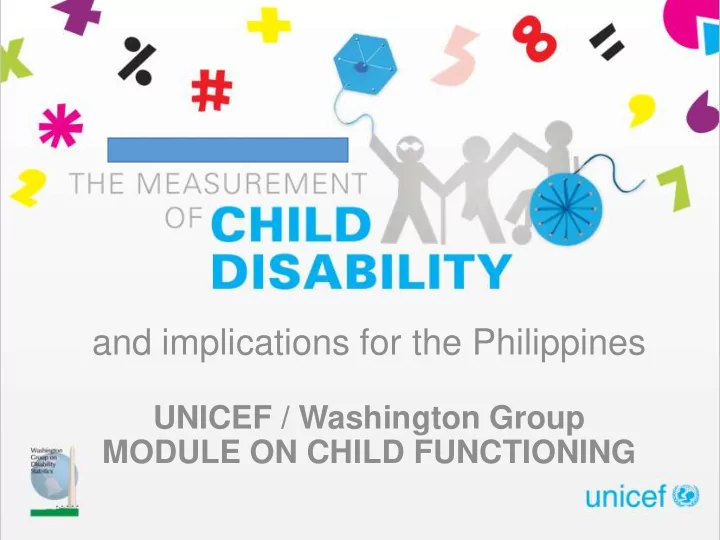

and implications for the Philippines UNICEF / Washington Group MODULE ON CHILD FUNCTIONING
The case for children ▪ Children have been less visible in the data collection agenda ▪ General household surveys and censuses found to inadequately identify children with disabilities ▪ Children might be overlooked on surveys that do not ask specifically about them ▪ Children of low socioeconomic status and girls in general might be particularly under- enumerated Child Disability Measurement Workshop
The case for children ▪ Challenges in measuring child disability ▪ Child development - Trajectory of child development - Domains of child development - Role of parents ▪ How child development influences measurement of child disability Child Disability Measurement Workshop
Specific measurement challenges for children ▪ Types of disability in children is different from adult disability - In adults the major problems are associated with mobility and sensory functioning, and personal care - especially in advancing years - In children the main disabilities are related to intellectual functioning, affect and behaviour ▪ Therefore, questions used for adults are not always appropriate for children - Questions addressed to adults are inappropriate or different in kind for children (e.g. falling over, stretching) - Questions addressed to children are sometimes inappropriate for adults (e.g. crawling, running) Child Disability Measurement Workshop
UNICEF / WG Module on Child Functioning ▪ Uses the ICF-CY as the conceptual framework and relies on a functional approach to measuring disability ▪ Builds on the Washington Group’s work on the short and extended set of questions for adults and other disability surveys ▪ Finalized in 2016, covers children between 2 and 17 years of age and assesses functional difficulties in different domains ▪ The set of questions is intended for use in national household surveys and censuses. And provides for cross-nationally comparable data Child Disability Measurement Workshop
UNICEF/WG Domains of child development ▪ Domains of development are interrelated: - mobility - vision - hearing - communication - cognition and learning - social-emotional development Child Disability Measurement Workshop
Content and Structure ▪ Questions ask about difficulties the child may have in doing certain activities ▪ Questionnaires for children 2-4 and 5-17 ▪ Response categories are, exception for 5 questions: − No difficulty − Some difficulty − A lot of difficulty − Cannot do at all Child Disability Measurement Workshop
Domains Children aged 2 to 4 Children aged 5 to 17 Seeing Seeing Hearing Hearing Mobility Mobility Self care Fine motor Communication/Comprehension Communication/Comprehension Learning Learning Remembering Focusing attention and concentrating Relationships Copying with change Controlling behaviour Controlling behaviour Emotions : anxiety and depression Playing
16 questions 24 questions
Example: Question on Seeing Children aged 2-17 years Does ( name ) wear glasses or contact lenses*? Yes No When wearing his/her glasses or Does ( name ) have difficulty *contact lenses, does ( name ) seeing? have difficulty seeing? Would you say… Would you say… No difficulty No difficulty Some difficulty Some difficulty A lot of difficulty A lot of difficulty Cannot do at all Cannot do at all * Only in 5-17 questionnaire
Avoids stigmatizing.. Ten Questions Screen, and how they are now phrased in the Module on Child Functioning: ▪ Question from the Ten Questions Screen (TQSI) Compared with children of the same age, does (name) appear in any way mentally backward, dull, or slow? Yes/no ▪ Question from the Module on Child Functioning Compared with children of the same age, does (name) have difficulty learning things? Would you say (name) has: no difficulty, some difficulty, a lot of difficulty or cannot do at all? Child Disability Measurement Workshop
Results across modules Serbia, 2016 Child Disability Measurement Workshop
Important to remember ▪ Domains are not meant to be looked at in isolation ▪ Not recommended to reduce number of questions, change response categories, modify content or change cut-offs ▪ Ensure the questions are translated correctly to retain intent and meaning (UNICEF / WG can assist) Child Disability Measurement Workshop
Child Disability Measurement Workshop
Components ▪ Attitudes (all respondents) ▪ School environment (mother or primary caregiver of a child who is currently attending school) ▪ Out of school (mother or primary caregiver of a child who is currently not attending school) **The module on Inclusive Education is still being field tested.
Domains ▪ Accessibility - Physical environment, information accessibility, communication accessibility, programme ▪ Attitudes Example: Do you think that children with disabilities should only go to special schools for those with disabilities? ▪ Affordability -fees, availability and type of assistance, non educational benefits Child Disability Measurement Workshop
Implications for Philippines ▪ Making every child count (inclusive policies, programs and services) ▪ Monitoring the SDGs - Philippines Statistics Authority - Indicators (7 targets, 12 indicators) Child Disability Measurement Workshop
Child Disability Measurement Workshop
Thank you! For more info, please visit https://www.unicef.org/disabilities/ Child Disability Measurement Workshop
Recommend
More recommend